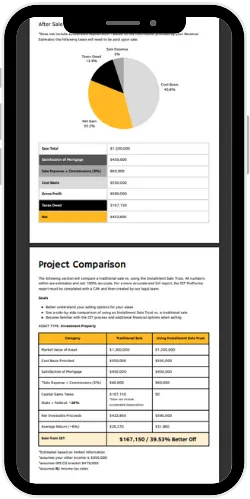Preserve Your Wealth for Generations by Turning Capital Gains Tax into an Income Source
The #1 Alternative to a 1031 Exchange
Get a Free SIS Trust Revenue Estimator
No1031 offers 1031 exchange alternatives in real estate and tax-deferring options for any home residence, business, investment property, or other highly-appreciated assets. Read more about how our cost-effective solutions may help your situation.
Get a Free Revenue Estimator
No1031 offers 1031 exchange alternatives in real estate and tax-deferring options for a home residence, business, investment property, or other highly-appreciated assets. Read more about how our solutions may help your situation.
What is a Structured Installment Sale Trust (SIS Trust)?
A Structured Installment Sales Trust (SIS Trust) is a trust arrangement that combines special-purpose vehicles with installment sales. This financial strategy is commonly used in property transactions, especially mergers and acquisitions or the sale of a business, to defer capital gains tax over time.
The Structured Installment Sale Trust is 100% IRS-accepted, allows cash liquidity, and has been around since the 70s. No1031.com is dedicated to making the Structured Installment Sale Trust more available to the public as it has been primarily used in M&A and large business deals in the past.
Why Use an SIS Trust?
Defer 100% of Capital Gains
The SIS Trust allows you to defer 100% of your capital gain liability at sale. This additional saving is then invested for a guaranteed 6% payment, turning your taxes owed into an income source.
Allows Basis Withdrawal
Using an SIS Trust allows you to take out your asset's cost basis. This means if you would like to have access to untaxed cash, only the taxable gain will go inside the trust and pay an income
Fully IRS-Accepted
Our CPAs and attorneys have carefully structured the SIS Trust to follow all IRS rules and guidelines. Over our 25 years of structuring ISTs, we're proud to say that we have never received an IRS audit.
Structured Installment Sale Trust Uses

Get an Idea of Your SIS Trust
The Revenue Estimator is a report about your asset, the tax savings, and additional information about the SIS Trust process. Every Revenue Estimator runs a tax assessment on your asset, showing the expected amount of taxes to be paid at closing. This tax assessment is based on the income information provided to us for the report.
The Revenue Estimator was created to quickly compare the difference between using a SIS Trust to a traditional sale. This is a rough comparison and uses conservative numbers. You usually have enough information to fill this report out on your own.

Get an Idea of Your SIS Trust
The Revenue Estimator is a report about your asset, the tax savings, and additional information about the SIS Trust process. Every Revenue Estimator runs a tax assessment on your asset, showing the expected amount of taxes to be paid at closing. This tax assessment is based on the income information provided to us for the report.
The Revenue Estimator was created to quickly compare the difference between using a SIS Trust to a traditional sale. This is a rough comparison and uses conservative numbers. You usually have enough information to fill this report out on your own.


Real Estate Solutions
With a SIS Trust, you're selling your asset to a trust and receiving payments over time. The trustee invests the money from the sale of your asset, aiming to generate a return similar or better to your current property. Similar to market value appreciation in real estate, the total trust value grows in addition to paying you income.

Business Solutions
A 1031 exchange can not be used for business sales. Exiting a business comes with similar or worse tax consequences as selling real estate. The SIS Trust is an excellent tax-advantageous solution for business owners looking to exit. Additionally, it provides a predictable income stream during their retirement years, helping to ensure financial security.



Cryptocurrency Solutions
With the SEC becoming more accepting to crypto, they are expecting more taxes to be paid on their gains. The SIS Trust allows you to turn realized crypto gains into an income-paying asset without having to give up to 40% of your portfolio to the IRS.

Are You a Real Estate Agent, Business Broker, or Insurance Agent?
Learn how you can offer this to your clients!
SIS Trust FAQ
What are the fees?
1% annual fee of total trust value. .5% goes to the trustee and .5% goes to the Registered Investment Advisor (1% per year total).
A 1-time $10,000 fee taken at escrow close to pay for the trust establishment. This fee is directly sent to the tax attorney that establishes the trust.
$850 paid annually from the trust to file the trust's tax return
$40 paid monthly from the trust for the Trust's Citi Bank Account ($85 total, we cover $45)
*The 6% yearly income steam is net after all fees and based on the principle invested.
Can I do this with my own trust?
No, you can not use this for your current trust. Additionally, you can not be the direct trustee of the trust. You maintain control over the trust with the promissory note granted to you at the time of the sale. This note fully protects your assets in the trust and grants you control.
Do I have to put all of my gain inside the trust?
No, we recommend only putting the taxable gain inside the trust. You are allowed to take your basis out, untaxed. If you want a larger, passive income, and do not require a large sum of cash, we recommend putting the entirety inside the trust instead.
What are the downsides?
- Fees.
- You can not be the trustee (which is not necessarily bad).
- There has to be a business purpose for the trust other than deferring taxes. To combat this, there is a profit sharing agreement on the additional upside after payouts (never effecting principal).
How can I see the money in the SIS Trust?
You can see the funds from the Citi Bank app on your phone, just like having an additional bank account. Withdrawals from principal require documentation since they trigger certificate of receipt, requiring capital gains to be paid.
Can I take the 121 tax exemption out like my basis?
Yes; however, on a pro-rata basis. Married couples receive up to a $500,000 tax break and singles receive up to a $250,000 tax break. For example, you are married and have a $1,000,000 personal residence with a $100,000 basis ($900,000 taxable gain). in this case, you would be able to access 1/10th of the 121 exemption since you are only taking 1/10th of the assets value. The rest of the money will be left in the trust.
if you decide to sell and pay the tax, you will be on the hook for capital gains tax on $400,000 if you're married or $650,000 if you are single. Your capital gains tax bracket is determined by the entire gain before the 121 exemption.
What is a Monetized Installment Sale? (We do not do this)
Monetizing is the act of taking a loan from the installment trust after it is established. This collateralizes the trust in your name, which is illegal since the trustee is technically the "Owner" of the asset. Any loans taken with the trust as collateral are subject to taxation and penalties; therefore, we do not allow them. Monetized Installment Sales are on the IRS Dirty Dozed list and are NOT analogous to Structured Installment Sales.
What if I want Out of the Trust?
At any time, you may leave the trust. By doing so, you are subject to the original capital gains tax you would have paid. This will immediately fulfil the financing agreement and all pre-taxed funds will be sent to you. If you previously performed a SIS Trust with your personal residence, you will still receive the 121 tax exemption ($250,000-$500,000 tax break) at the time of liquidation.
Can I pass the SIS Trust to my heirs?
Yes, the SIS Trust can be passed down from generation to generation. After passing, the SIS Trust receives a step up in basis, granting your heirs the option to liquidate tax-free or continue to grow and collect from the trust.
Ready to start your own Structured Installment Sale Trust (SIS Trust) plan?
Schedule a 15-minute phone call for further questions or getting started.
Nothing on this site should be interpreted to state or imply that past results are an indication of future performance. This site does not constitute a complete description of our investment services and is for informational purposes only. It is in no way a solicitation or an offer to sell insurance, annuities, securities or investment advisory services except, where applicable, in states where we are registered or where an exemption or exclusion from such registration or licensing exists. Information throughout this internet site, whether stock quotes, charts, articles, or any other statements regarding market or other financial information, is obtained from sources which we, and our suppliers believe reliable, but we do not warrant or guarantee the timeliness or accuracy of this information. Neither our information providers nor we shall be liable for any errors or inaccuracies, regardless of cause, or the lack of timeliness of, or for any delay or interruption in the transmission thereof to the user. All investments involve risk, including foreign currency exchange rates, political risks, different methods of accounting and financial reporting, and foreign taxes.
